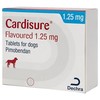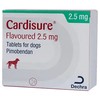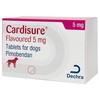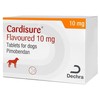Cardisure
Cardisure Flavoured Tablets for Dogs are indicated for the treatment of canine congestive heart failure originating from valvular insufficiency (mitral and/or tricuspid regurgitation) or dilated cardiomyopathy.
Cardisure Flavoured Tablets are available in 4 different strengths, and are presented as round, light brown tablets that have been scored on one side for easy and accurate dosing.
Cardisure 1.25mg Flavoured Tablets for Dogs
£0.36Cardisure 1.25mg Flavoured Tablets for Dogs are for the treatment of canine congestive heart failure originating from valvular insufficiency (mitral and/or tricuspid regurgitation) or...[More info]
Cardisure 2.5mg Flavoured Tablets for Dogs
£0.59Cardisure 2.5mg Flavoured Tablets for Dogs are for the treatment of canine congestive heart failure originating from valvular insufficiency (mitral and/or tricuspid regurgitation) or...[More info]
Cardisure 5mg Flavoured Tablets for Dogs
£1.07Cardisure 5mg Flavoured Tablets for Dogs are for the treatment of canine congestive heart failure originating from valvular insufficiency (mitral and/or tricuspid regurgitation) or dilated...[More info]
Cardisure 10mg Flavoured Tablets for Dogs
£1.62Cardisure 10mg Flavoured Tablets for Dogs are for the treatment of canine congestive heart failure originating from valvular insufficiency (mitral and/or tricuspid regurgitation) or dilated...[More info]
Indications for use
For the treatment of canine congestive heart failure originating from valvular insufficiency (mitral and/or tricuspid regurgitation) or dilated cardiomyopathy.
Contraindications
Do not use in cases of hypertrophic cardiomyopathies or clinical conditions where an augmentation of cardiac output is not possible for functional or anatomical reasons (e.g. aortic stenosis).
See also Use during pregnancy and lactation.
Special warnings for each target species
The product should be administered on an empty stomach at least one hour before meals, as absorption is reduced when given with feed.
The product is flavoured. To avoid accidental ingestion the tablets should be stored out of reach of dogs.
An in vitro study in rat tissue demonstrated that pimobendan increased glucose-induced insulin release from pancreatic β-cells in a dose-dependent manner. If the product is administered to diabetic dogs, blood glucose levels should be carefully monitored.
As pimobendan is metabolised in the liver, particular care should be taken when administering the product to dogs with severe hepatic insufficiency.
Monitoring of cardiac function and morphology is recommended in animals treated with pimobendan.(See also Adverse reactions).
Special precautions to be taken by the person administering the veterinary medicinal product to animals.
In case of accidental ingestion, seek medical advice immediately and show the package leaflet or the label to the physician.
Wash hands after use.
Advice to doctors: accidental ingestion, especially by a child, may lead to the occurrence of tachycardia, orthostatic hypotension, flushing of the face and headaches.
Adverse reactions
A moderate positive chronotropic effect and vomiting may occur in rare cases. However, these effects are dose-dependent and may be avoided by reducing the dose in these cases. In rare cases transient diarrhoea, anorexia or lethargy have been observed.
Although a relationship with pimobendan has not been clearly established, in very rare cases, signs of effects on primary haemostasis (petechiae on mucous membranes, subcutaneous haemorrhages) may be observed during treatment. These signs disappear when the treatment is withdrawn.
In rare cases, an increase in mitral valve regurgitation has been observed during chronic pimobendan treatment in dogs with mitral valve disease.
The frequency of adverse reactions is defined using the following convention:
-very common (more than 1 in 10 animals displaying adverse reactions during the course of one treatment)
-common (more than 1 but less than 10 animals in 100 animals)
-uncommon (more than 1 but less than 10 animals in 1,000 animals)
-rare (more than 1 but less than 10 animals in 10,000 animals)
-very rare (less than 1 animal in 10,000 animals, including isolated reports).
Use during pregnancy and lactation
Laboratory studies in rats and rabbits have not produced any evidence of teratogenic or fetotoxic effects. However, these studies have shown evidence of maternotoxic and embryotoxic effects at high doses, and have also shown that pimobendan is excreted into milk. The safety of the product has not been assessed in pregnant or nursing bitches. Use only according to the benefit/risk assessment by the responsible veterinarian.
Interactions
In pharmacological studies no interaction between the cardiac glycoside ouabain and pimobendan was detected. The pimobendan-induced increase in contractility of the heart is attenuated in the presence of the calcium antagonist verapamil and the β-antagonist propranolol.
Amounts to be administered and administration route
Do not exceed the recommended dosage.
Determine the body weight accurately before treatment to ensure correct dosage.
The tablets should be administered orally at a dose range of 0.2 mg to 0.6 mg pimobendan/kg body weight per day. The preferable daily dose is 0.5 mg pimobendan/kg body weight. The dose should be divided into two administrations (0.25 mg/kg body weight each), one half of the dose in the morning and the other half approximately 12 hours later. The maintenance dose should be individually adjusted by the responsible veterinarian according to the severity of the disease.
The product may be combined with a diuretic treatment, e.g. furosemide.
Cardisure flavoured 1.25 mg tablets for dogs: To break a tablet into two halves, place the tablet on an even surface with the scored side up, hold one half of the tablet and press down on the other half.
Cardisure flavoured 2.5 mg/5 mg/10 mg tablets for dogs: To break a double scored tablet into quarters, place the tablet on an even surface with the scored side up and apply pressure on the middle with our thumb.
Each dose should be given approximately one hour before feeding.
Overdose
In the case of overdose, a positive chronotropic effect and vomiting may occur. In this situation, the dosage should be reduced and appropriate symptomatic treatment should be initiated.
In prolonged exposure (6 months) of healthy beagle dogs at 3 and 5 times the recommended dose, mitral valve thickening and left ventricular hypertrophy were observed in some dogs.



